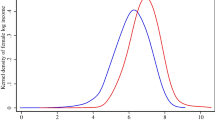Abstract
Analysis of the extent to which husbands and wives agree in their attitudes toward a number of key issues that may affect fertility behavior shows that although aggregate views of men and women are remarkably similar, marital couples are frequently in disagreement, particularly if measures discounting for chance agreement of responses are employed. In other words, we cannot accept either the husband or the wife as a surrogate respondent. These conclusions are based on data from cross-sectional surveys in a developing society, Taiwan, of 2000 couples in which the wife was of childbearing age. The impact on fertility of such marital disagreement varies with the attitude in question. Followup birth data over a four-year period indicate that, when there is disagreement, it is the wife's attitude that has more influence on fertility, particularly if she has the stronger belief about the future security and status to be derived from a large family and from sons.
Similar content being viewed by others
References
Andrews, F., Morgan, J., Sonquist, J., & Klem, L. Multiple Classification Analysis. 1973, Ann Arbor: Institute for Social Research.
Brackbill, Y. Test-Retest reliability in population research.Studies in Family Planning. 1974,5 261–266.
Coombs, L. C. Levels of reliability in fertility survey data: Taiwan.Studies in Family Planning. 1977,8 218–232.
Coombs, L. C. & Fernandez, D. Husband-wife agreement about reproductive goals.Demography 1978,15 57–73.
Coombs, L. C. & Freedman, R. Some Roots of Preference: Roles, Activities, and Familial Values.Demography 1979,16 359–376.
Freedman, R. & Coombs, L. C., eds. Cross-cultural comparisons: Data on two factors in fertility behavior. An Occasional Paper of the Population Council, New York, 1974.
Freedman. R. & Takeshita, J. Y.Family Planning in Taiwan: An Experiment in Social Change. Princeton: Princeton University Press, 1969.
Fried, E. S. & Udry, J. R. Wives' and husbands' expected costs and benefits of childbearing as predictors of pregnancy: Report on a longitudinal study. Paper presented at the annual meeting of the Population Association of America, Philadelphia, April 1979.
Kar, B. Factors in consistency between family planning attitudes and behavior: The Venezuela study. Paper presented at the session on "The Measurement, Reliability and Validity of Fertility Attitudes," International Union for the Scientific Study of Population Conference, Mexico City, 1977.
Knodel, J. & Prachuabmoh, V. Preferences for sex of children in Thailand: A comparison of husbands' and wives' attitudes.Studies in Family Planning 1976,7 137–43.
Misra, B.D. A comparison of husbands' and wives' attitudes toward family planning.Journal of Family Welfare 1966,12 9–23.
Mitchell, R.E. Husband-wife relations and family planning practices in urban Hong Kong.Journal of Marriage and the Family 1972,34 139–146.
Mukherjee, B.N. Marital decision making and family planning.The Journal of Family Welfare 1975,21 77–101.
Ryder, N.B. Consistency of reporting fertility planning status.Studies in Family Planning 1979,10 115–128.
Stycos, J.M., Back, K., & Hill, R. Problems of communication between husband and wife on matters relating to family limitation.Human Relations 1956,1 207–215.
Sun, T.H., Lin, H.S., & Freedman, R. Trends in fertility, family size preferences, and family planning practice: Taiwan, 1961–76.Studies in Family Planning 1978,9 54–70.
Williamson, N.E. Preference for sons around the world. Dissertation, Department of Sociology, Harvard University, 1972.
Wolf, M.Women and the Family in Rural Taiwan. Stanford: Stanford University Press, 1972.
Yaukey, D., Griffiths, W., & Roberts, B.J. Couple concurrence and empathy on birth control motivation in Dacca, East Pakistan.American Sociological Review 1967,32 716–26.
Yaukey, D., Roberts, B.J., W. Griffiths, Husbands' vs. wives' responses to a fertility survey.Population Studies 1965,19 29–43.
Author information
Authors and Affiliations
Additional information
The data for this paper were collected by the Taiwan Provincial Institute of Family Planning under the direction of T.S. Sun, in collaboration with the University of Michigan Population Studies Center and with the financial assistance of the Population Council. Grants from the Center for Population Research of the National Institute of Child Health and Human Development and the Ford Foundation provided support for the analysis. We wish to acknowledge the assistance of James B. Rogers in the computer work and of Ronald Freedman in comments on an earlier version of this paper.
Rights and permissions
About this article
Cite this article
Coombs, L.C., Chang, MC. Do husbands and wives agree? Fertility attitudes and later behavior. Popul Environ 4, 109–127 (1981). https://doi.org/10.1007/BF01255801
Issue Date:
DOI: https://doi.org/10.1007/BF01255801




